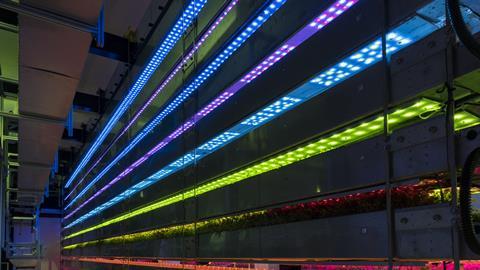Amaranth production is at the centre of two-year, Innovate UK-funded project led by Vertical Future
Tech business Vertical Future has announced it is leading the Innovate UK-funded Vertical Indoor Protein from Leaf (VIP Leaf) research project, within the farming innovation programme, aiming to develop a new source of alternative plant protein.
The two-year project will develop methods to use vertical farming facilities to grow amaranth, a plant known for its many health benefits and numerous antioxidants, which is also undervalued in the current UK food market.
The amaranth crops will be used to develop a new source of plant protein that it is hoped will decrease the UK’s reliance on imports of plant proteins such as soy and pea, boosting not just the UK economy and environmental impact but also the health of the average UK consumer.
Amaranth has been proven to be a lower-cost alternative to the more commonly used pea protein. Amaranth is commonly eaten in southern Africa, southeast Asia and South America and with indoor farming technology, could be grown in the UK year-round.
The demand for plant-based protein is increasing as the vegan, vegetarian and flexitarian food markets grow as consumers look to make healthy and sustainable choices. The VIP Leaf project aims to address growing demand by bringing together experts working in vertical farming technology and crop biology to develop a high-yielding, high-protein, quality crop.
The crop can then be used to develop recipes for a meat alternative that is a market-ready product for UK consumers. Conducting the growing process exclusively within vertical farming facilities is said to reduce water and energy consumption, reduce the amount of land for cultivation, and decrease carbon emissions emitted during the transportation process as the vertical farm is located on the food manufacturing site.
Vertically farmed amaranth will have lower environmental costs compared to other more widely available plant proteins, according to Vertical Future.
The project will be led by Vertical Future along with the University of York, Crop Health and Protection Limited (CHAP), an Innovate UK-funded Agri-tech centre, and Syan Farms and Eat Curious, a plant-based food development company.
It is hoped that the results of the project will help the UK meet net-zero carbon by 2050, through a revolutionary approach to food science and farming, driven by crop technology and vertical farming.
Dr Jennifer Bromley, chief scientific officer at Vertical Future, said: “Being able to help contribute to the economy, environment, and health of the UK through our extensive expertise in crop science and vertical farming technology is an exciting place to be. The funding from Innovate UK makes the VIP Leaf project possible, allowing us to research new methods of growing amaranth in controlled environments to form an alternative leaf-derived protein ready for market consumption.
”The VIP Leaf project will make Vertical Future the first agricultural technology company to demonstrate its systems in the production of plant-derived protein.”




